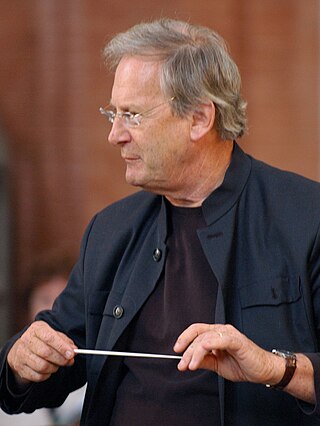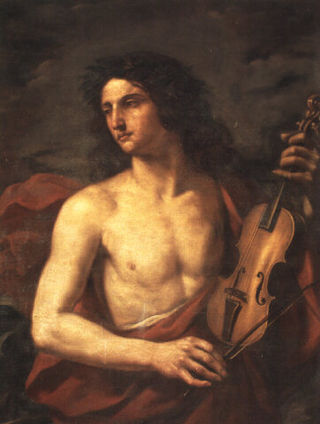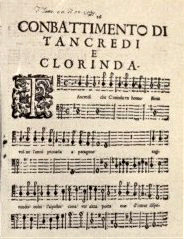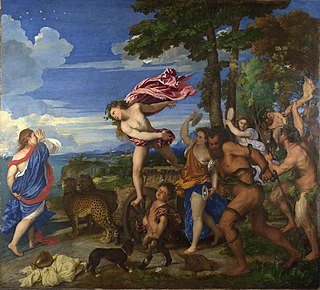Related Research Articles

Claudio Giovanni Antonio Monteverdi was an Italian composer, choirmaster and string player. A composer of both secular and sacred music, and a pioneer in the development of opera, he is considered a crucial transitional figure between the Renaissance and Baroque periods of music history.

Vespro della Beata Vergine, SV 206, is a musical setting by Claudio Monteverdi of the evening vespers on Marian feasts, scored for soloists, choirs, and orchestra. It is an ambitious work in scope and in its variety of style and scoring, and has a duration of around 90 minutes. Published in Venice as Sanctissimae Virgini Missa senis vocibus ac Vesperae pluribus decantandae, cum nonnullis sacris concentibus, ad Sacella sive Principum Cubicula accommodata, it is sometimes called Monteverdi's Vespers of 1610.

Sir John Eliot Gardiner is an English conductor, particularly known for his performances of the works of Johann Sebastian Bach, especially the Bach Cantata Pilgrimage of 2000, performing Bach's church cantatas in liturgical order in churches all over Europe, and New York City, with the Monteverdi Choir, and recording them at the locations.
The year 1607 in music involved some significant events.

L'Orfeo, or La favola d'Orfeo, is a late Renaissance/early Baroque favola in musica, or opera, by Claudio Monteverdi, with a libretto by Alessandro Striggio. It is based on the Greek legend of Orpheus, and tells the story of his descent to Hades and his fruitless attempt to bring his dead bride Eurydice back to the living world. It was written in 1607 for a court performance during the annual Carnival at Mantua. While Jacopo Peri's Dafne is generally recognised as the first work in the opera genre, and the earliest surviving opera is Peri's Euridice, L'Orfeo is the earliest that is still regularly performed.

Vincenzo Ι Gonzaga was the ruler of the Duchy of Mantua and the Duchy of Montferrat from 1587 to 1612.

Il combattimento di Tancredi e Clorinda, SV 153, is an operatic scena for three voices by Claudio Monteverdi. The libretto is drawn from Torquato Tasso's La Gerusalemme Liberata. It was first performed in Venice in 1624, and printed in 1638 in Monteverdi's eighth book of madrigals. Monteverdi used musical features here for the first time to enhance the dramatic depiction of a battle in stile concitato, such as pizzicato and tremolo.

L'Arianna is the lost second opera by Italian composer Claudio Monteverdi. One of the earliest operas in general, it was composed in 1607–1608 and first performed on 28 May 1608, as part of the musical festivities for a royal wedding at the court of Duke Vincenzo Gonzaga in Mantua. All the music is lost apart from the extended recitative known as "Lamento d'Arianna". The libretto, which survives complete, was written in eight scenes by Ottavio Rinuccini, who used Ovid's Heroides and other classical sources to relate the story of Ariadne's abandonment by Theseus on the island of Naxos and her subsequent elevation as bride to the god Bacchus.
Timothy Carter is an Australian musicologist with a special focus on late Renaissance music and Italian Baroque music. An active member of the field of musicology, Carter is a department chair at the University of North Carolina at Chapel Hill, where he holds the position of David G. Frey Distinguished Professor. He has worked on the editorial boards or staffs of a number of prominent musical publications and has published extensively in the field.
Werner Erich Josten was a German-born composer of contemporary classical music. He studied in Munich with Rudolf Siegel and in Geneva with Émile Jaques-Dalcroze, and emigrated to the United States in 1920 or 1921. He became a naturalized citizen and taught at Smith College in Northampton, Massachusetts from 1923 to 1949, where his notable students included Audrey Kooper Hammann. The Werner Josten Performing Arts Library at Smith College is named for him.

Eurydice was a character in Greek mythology and the Auloniad wife of Orpheus, whom Orpheus tried to bring back from the dead with his enchanting music.
These lists show the audio and visual recordings of the opera L'Orfeo by Claudio Monteverdi. The opera was first performed in Mantua in 1607, at the court of Duke Vincenzo Gonzaga, and is one of the earliest of all operas. The first recording of L'Orfeo was issued in 1939, a freely adapted version of Monteverdi's music edited by Giacomo Benvenuti, given by the orchestra of La Scala Milan conducted by Ferrucio Calusio. In 1949 the Berlin Radio Orchestra under Helmut Koch recorded the complete opera, on long-playing records (LPs). The advent of LP recordings was, as Harold Schonberg later wrote, an important factor in the postwar revival of interest in Renaissance and Baroque music, and from the mid-1950s recordings of L'Orfeo have been issued on many labels. Koch's landmark version was reissued in 1962, when it was compared unfavourably with others that had by then been issued. The 1969 recording by Nicholas Harnoncourt and the Vienna Concentus Musicus, using Harnoncourt's edition based on period instruments, was praised for "making Monteverdi's music sound something like the way he imagined". In 1981 Siegfried Heinrich, with the Early Music Studio of the Hesse Chamber Orchestra, recorded a version which re-created the original Striggio libretto ending, adding music from Monteverdi's 1616 ballet Tirsi e Clori for the Bacchante scenes. Among more recent recordings, that of Emmanuelle Haïm has been praised for its dramatic effect. The 21st century has seen the issue of an increasing number of recordings on DVD and Blu-ray.
Giovanni Gualberto Magli was an Italian castrato who had an active singing career during the first quarter of the 17th century. Born in Florence, he studied voice with Giulio Caccini before becoming a musician for the House of Medici on 23 August 1604. He participated in the world premiere of Claudio Monteverdi's L'Orfeo in 1607 at the court of Prince Francesco IV Gonzaga, Duke of Mantua, portraying the roles of La Musica and Proserpina and possibly one other part. The musicologist and historian Hans Redlich mistakenly allocates Magli to the role of Orfeo. In 1608 Magli sang for the wedding festivities of Cosimo II de' Medici, Grand Duke of Tuscany and Archduchess Maria Maddalena of Austria. In October 1611 he was granted two years paid leave by Antonio de' Medici to pursue further studies in Naples. He left Medici service in 1615 to join the musicians at the court of John Sigismund, Elector of Brandenburg. He remained there until September 1622. He was buried in Florence on 8 January 1625.
Giovanni Maria Bacchini was an Italian castrato, composer, writer on music, and Roman Catholic priest who flourished during the late 16th century and early 17th century.
Giacomo Benvenuti was an Italian composer and musicologist.

The Italian composer Claudio Monteverdi (1567–1643), in addition to a large output of church music and madrigals, wrote prolifically for the stage. His theatrical works were written between 1604 and 1643 and included operas, of which three—L'Orfeo (1607), Il ritorno d'Ulisse in patria (1640) and L'incoronazione di Poppea (1643)—have survived with their music and librettos intact. In the case of the other seven operas, the music has disappeared almost entirely, although some of the librettos exist. The loss of these works, written during a critical period of early opera history, has been much regretted by commentators and musicologists.

This is a discography of the recordings of Vespro della Beata Vergine by Claudio Monteverdi – also known as his Vespers of 1610. Since the first vinyl recordings of the work in 1953, the Vespers have been recorded in numerous versions. Some versions are choral-based, others use one voice per part (OVPP). Some versions use modern instruments, but since the first recording on period instruments appeared in the 1960s their use has become normal. Sir John Eliot Gardiner has recorded the Vespers with both modern and period instruments, explaining that the latter are now played to a higher standard than when he made his first recording in the 1970s. In the late 1970s the Monteverdi orchestra, which he founded, transitioned to period instruments and became the English Baroque Soloists.
References
- ↑ Bio of John Whenham at the University of Birmingham]